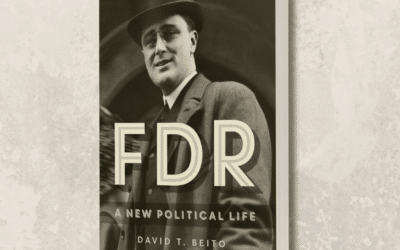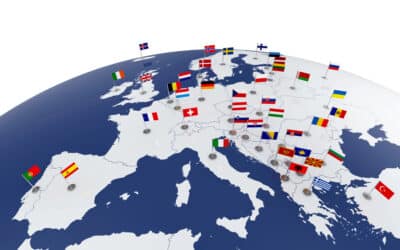A few libertarians and other principled opponents of the warfare state assured us we likely would sleep easier with Donald Trump, rather than any neoconservative or humanitarian interventionist, in the White House. How’s that working out? Not so well. I’m hoarding melatonin and buying stock in Lunesta.
In its opening days the Trump administration has rattled the saber at Iran, China, and North Korea. This is hardly comforting, considering that pronouncements from Trump and his closest advisers could have come from the foreign-policy establishment he supposedly upended. If this is disruption, I’d hate to see what an embrace of The Consensus would look like. The possible appointment of Elliott Abrams, the quintessential neoconservative — architect of and apologist for mass murder in the Middle East — as deputy secretary of state is just one more sign that Peaceniks for Trump have been gulled. [UPDATE: Trump has decided not to appoint Abrams.]
What about Trump’s position on Russia? they will ask. What about it? Not taking Bill O’Reilly’s bait (transcript here) doesn’t count as being pro-peace, especially when Trump had his UN ambassador, Nikki Haley, warn that sanctions against Russia won’t be removed until Vladimir Putin relinquishes Crimea. Haley’s declaration was a reversal of Trump’s earlier, better (though flawed) position that sanctions would be tied to a mutual reduction of both countries’ nuclear arsenals. Now we’re back to the Obama position. One need not defend Russia’s move on Crimea (even if most inhabitants favored it) to see the context: the U.S.-engineered coup (backed by neo-Nazi elements) against Ukraine’s elected president in favor of a neocon favorite — not to mention the larger context: the decades-long expansion of NATO to the Russian border and incorporation of former Russian allies into the U.S-led sphere. Provocation begets counter-moves, which in the Ukrainian case were hardly surprising, considering the historical and strategic importance of Crimea to Russia. The Soviet Union is not being reconstructed.
As we’ll see, whatever good Trump has in mind regarding relations with Russia will be undercut by other attitudes he harbors, particularly his bellicosity toward Iran, Russia’s ally. When it comes time to choose between detente with Russia or confrontation with Iran, I have no confidence Trump will make the right choice.
It is fascinating, I will concede, to see the elite’s and its news media’s hysteria over Trump’s reference to America’s lack of innocence when discussing Putin’s alleged homicidal conduct. Presidents are not supposed to refer to such things (even if they are true). Unfortunately, Trump does not appear disturbed by the U.S. government’s lethal record and did not vow to change things. Moreover, “[t]he president wasn’t just suggesting that government is a morally gray business that always involves some violence and wrongdoing,” Jacob T. Levy writes. “In his comments, he seemed to give up on the idea that there is such a thing as wrongdoing at all.”
Trump’s amoralism aside, are we all really supposed to believe — or is it pretend — that government’s hands were not blood-stained from day one in America, notwithstanding sugared words? Is that what the civil religion requires — that we ignore the crimes against American Indians, Africans, Filipinos, Japanese, Germans, Koreans, Vietnamese, Latin Americans, Afghans, Iraqis, Pakistanis, Yemenis, Libyans, Somalis, and Syrians? And those are just direct victims of official U.S. atrocities. The list of atrocities merely enabled by American presidents and their henchmen is much longer. (For two examples see the cases of Bangladesh and East Timor.) The list of regime changes (Iran, 1953, most relevantly) and assassinations is also long. (I have not ventured into the government’s many domestic crimes, such as biological, chemical, and psychological experimentation on unwitting Americans.) A self-styled exceptional nation, a global empire, and the world’s arms merchant is bound to get its hands soiled.
That even hinting at this bloody history is forbidden tells us a lot about “secular” America. Trump’s blasphemy was especially egregious because he was discussing Russia, the anti-America. (For a more reasonable, realistic take on Russia, see the British conservative writer Peter Hitchens’s “The Cold War Is Over.”) The news media and the high priests of America’s civil religion could not condemn Trump’s insult to the Holy National Church — the American State — in harsh enough terms. (For details on America’s civil religion, see chapter 2 of William Cavanaugh’s The Myth of Religious Violence: Secular Ideology and the Roots of Modern Conflict.) Trump may want to strip the citizenship from and imprison those who burn the sacred flag, but that’s not enough for the defenders of the American faith, who contradictorily accuse him of endorsing both moral equivalence and moral relativism. (He can’t be doing both.) He must show he believes that America (i.e., the American State) is innocent — that all violence committed in its name was in a holy cause, unlike that of other nations (excluding Israel, of course, the other exceptional nation).
Not that Trump — who tries hard to look like a serious man who knows what he’s talking about — shows any sign of understanding this history (remember, he wants to make America great again) or of having any inclination to reverse course. When O’Reilly asked Trump to defend his statement that “we’ve got a lot of killers [too],” — O’Reilly had accused Putin of being a “killer” and therefore is unworthy of Trump’s respect — all Trump could do was feebly name the “mistake” of the 2003 Iraq invasion (which he favored in the run-up). O’Reilly replied that mistakes are not comparable. Trump said: “A lot of mistakes, but a lot of people were killed. A lot of killers around, believe me.” Again, Trump didn’t condemn those killers. Besides Iraq was no mistake. It was a war of aggression and a violation of the Nuremberg principles. (Trump once said Americans were lied into Iraq, but then wimpily backed down when confronted by an offended veteran in South Carolina.)
Trump’s reply to O’Reilly was so bad it destroyed what might have been a valuable teaching moment. Instead, Trump looked like an idiot. He certainly did not advance his objective to “get along with Russia.”
What he should have said is that the dramatic indignation at Putin’s crimes (whatever they are; evidence of his complicity is scant, although the number of killings is ominous and his regime is hardly liberty-friendly) is highly selective, that the U.S. government has a record of embracing brutal rulers (Egypt’s al-Sisi and Turkey’s Erdogan some to mind), and that Russia has a nuclear arsenal to match America’s, so the two countries ought to cooperate in getting rid of those monstrous weapons. When O’Reilly said, “I don’t know of any [American] government leaders that are killers,” Trump might have pointed out that, to take but one recent example, the Nobel Peace Prize-winning Barack Obama drew up a list of people to be killed by drones every week. Trump might have also said that the botched raid in Yemen put him in the class of “government leaders that are killers.”
As noted, after Russia, it’s all downhill with Trump. He and his closest advisers are obsessed with Iran, which represents no threat to Americans and with whom, by the way, the U.S. government is tacitly allied in Iraq against the Islamic State. Iran has no nuclear-weapons program — never had one — and not much of a military, yet it has been continually threatened and subjected to covert warfare by the United States and Israel, the Middle East’s sole nuclear power. Saudi Arabia also has missiles that could hit Iran. So Iran’s claim that the mid-range missiles it’s testing are for deterrence is credible, and they violate no UN resolution. But Trump used the missile test as an occasion for saber-rattling: once again an American president has said that for Iran “all options are on the table.” If Trump is supposed to be such a disrupter of establishment foreign policy, why doesn’t he see that his demonization of Iran is absurdly dangerous and contrary to the interests of most Americans? Is it in part because the Israeli government needs to demonize the Islamic Republic in order to divert attention from its continued usurpation of Palestinian-owned land? Does it have something to do with keeping close relations with Saudi Arabia, the cradle of “radical Islamic terrorism”?
Now Trump is carrying his anti-Iran animus over to pathetic Yemen, scene of a two-year-old U.S.-enabled Saudi onslaught and siege, which is inflicting mass starvation among other unspeakable consequences. There is no excuse for the United States’ helping Saudi Arabia and its gulf allies to pulverize the poorest country in the Middle East. While on the one hand, the United States strikes at al-Qaeda there (the recent botched raid killed many noncombatants and cost one American Navy SEAL’s life), on the other it helps al-Qaeda by enabling the Saudi war on the Houthis, who are misleadingly portrayed as Iran’s agents. (The Houthis have in fact acted contrary to Iran’s wishes.) Trump national-security adviser Michael Flynn recently described a Houthi attack on a Saudi frigate as an “Iranian action,” and press secretary Sean Spicer went further by charging, until corrected, that the “Iranian attack” was on an American ship. What advantage does Trump see in a confrontation and perhaps war with Iran?
Isn’t the incoherent and seemingly pointless intervention in Yemen just the sort of irrational policy Trump criticized in his campaign, however inarticulately? (Maybe it’s not really pointless: see Gareth Porter’s “Trump’s Hard Line on Iran Will Give Saudis Free Hand in Yemen.”) Enabling this destruction is yet another stain on America, and it supports Trump’s statement about the country’s lack of innocence — yet he’s the one now carrying it on.
We must also wonder if he has overlooked the fact that Russia, with which he says he wants to cooperate, is Iran’s ally and benefactor and that Iran is Syrian President Bashar al-Assad’s ally. Laying off Assad and concentrating on the Islamic State, which Trump says he wants to do, will benefit Iran, just as the intervention in Iraq does. Then what? Has no adviser pointed out the collision course Trump is on?
Contrary to assurances from Trump’s pro-peace cheerleaders, his narcissism, petulance, and conceit provide strong grounds to fear his conduct of foreign policy. He has vowed to make America so powerful (at what price?) that “no one will mess with us.” But rather than being reassuring, that kind of talk should make us worry about what he will do when he believes that some head of state is testing him. Russia and Iran are not the sorts of countries that take well to being assigned their place in the world by any American president.
I’m not one for quoting Madison, but among his keenest insights was that war is the gravest of all threats to liberty because it contains the germs of all the others. Or as Randolph Bourne put it, “War is the health of the State.” Therefore stripping the U.S. government of its capacity to operate a global empire and to wage war anywhere everywhere should be our priority. Trump’s taunting of the foreign-policy establishment is so far unmatched by his deeds; on the contrary, his conduct to date undermines the better parts of his message. Trump provides no reason to expect anything else.































